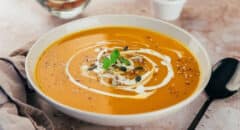
There is false information out there about food. It’s time to bust these popular food myths! If you eat at night will you gain more weight? Do carbs make you fat? Does tea dehydrate you? Is healthier food more expensive?
Here are 7 common food myths that are often repeated and shared as food truths.
READ: 9 Foods To Beat Constipation
1. Food Myth: Carbohydrates make you gain weight and become fat.
You may be familiar with the Atkins Diet. It is a popular diet that many have used to lose weight. The premise is that you eat a diet high in protein and fat and low in carbohydrates. Eliminating carbs does initially help you to lose weight. But, it is not sustaining. In studies where people practiced a low-carb diet, these individuals ended up regaining more weight at the end of the three-year period compared with low-fat dieters. Here is why. According to Jean Harvey-Berino, Ph.D., R.D., and chair of the department of nutrition and food sciences, it’s eating too many calories that make you fat. If you load up on sugary and refined-carbohydrate-rich foods i.e. white bread, pasta or doughnuts you will gain weight and also increase your risk for heart disease and diabetes.
Food Truth: However, there are “good-carb” foods you should include in your diet. Good carbs include whole grains, beans, fruits and vegetables. These carbs help to provide fuel to your body as well as fiber and nutrients. For those who have difficulty managing their weight and controlling their carb intake a low carb diet can be helpful. But, the key is to eat “good-carb” foods. This way you lessen your chance of overindulging in carbs that contain refined sugar and that lead to weight gain.
2. Food Myth: Eating at night is more fattening versus eating earlier in the day.
Total calorie intake is the key to maintaining your weight. It matters less when you eat, but more so the number of calories you eat. If you eat before bed, it doesn’t cause weight gain.
Food Truth: You gain more weight if your body uses more energy or calories that what is stored in your body that day. Having a snack before going to bed will help stabilize your blood sugar levels. It will also help you to manage or maintain your weight. However, try not to snack or eat at least one hour before you go to sleep, it will help you rest better and prevent acid reflux, which happens when you are unable to digest your food properly.3. Food Myth: Microwaved food is unsafe.
There is a perception that if you microwave your food, the radiation from the microwave can create dangerous compounds to become present in your food. When food is prepared in a microwave, this is the energy that travels in waves and spreads out as your food heats up.
Food Truth: Unlike X-rays and gamma rays which can cause health concerns, microwaves send much weaker waves than these radiation devices. If a change does occur in the food when microwaved, it comes from the heat that's generated inside the food, not within the microwave itself. Microwave cooking isn’t much different than other cooking methods we use to apply heat to food. However, if you are using a microwave to heat up your food, make sure you are not using plastics, but instead, you should use containers that are microwave-safe.
READ: 7 Slimming Summer Detox Foods
4. Food Myth: Drinking tea will make you dehydrated.
Since some teas have caffeine, it is often thought that tea will make you feel dehydrated. But, tea has very low levels of caffeine.
Food Truth: Even if you drink strong tea, it will not dehydrate you. Tea is 99.5% water and is considered part of your fluid intake for the day. Drinking tea will have the opposite effect and help you to stay hydrated.
5. Food Myth: Fruit has too much sugar.
Fruit contains sugar, but it is a healthier form of sugar. And, fruit offers other numerous benefits as well. Because of its fiber, vitamins and minerals fruit is an essential part of you being healthy.
Food Truth: Since fruit has sugar that is naturally sweetened, it helps you maintain your weight and decreases the chances of you getting a chronic disease.
6. Food Myth: Eliminating gluten-free food is better for your diet.
If you suffer from being intolerant to gluten or have celiac disease, then being gluten free is a better choice for you. Celiac disease is an autoimmune disorder which happens where ingestion of gluten causes damages in the small intestines. However, some gluten-free products have more sugar, fat and are higher in calories than gluten containing items do.
Food Truth: If you are looking to eat healthier whole grains, there are several options. Bulger, barley, brown rice, amaranth and quinoa are some choices. Since they are minimally processed containing nutrients and minerals such as iron, zinc, and calcium, they are healthy options for you.
7. Food Myth: Healthy food is expensive.
I have heard this one and I’m sure you have as well. Some hold the perception that it's difficult to eat healthy food because it’s expensive. But this is simply not true.
Food Truth: If you budget accordingly, you can still buy food that is healthy and affordable. You can often save by purchasing the store brand for your food items, but is less expensive versus the major name brand. Additionally, flours, whole grains, produce which is in season along with beans, eggs, and fruits and fish are affordable and healthier options for you to eat. You can also purchase fruits and veggies at local farmers markets. Remember, eating healthier food offsets the increased medical costs you can have if you don’t eat healthily.
Knowing these food truths will help you stay healthy and remain on the right nutritional path. Happy eating!









